- Browse
- Electronics
Results for "electronics"
 Status: PreviewPreviewG
Status: PreviewPreviewGGeorgia Institute of Technology
Skills you'll gain: Electronic Components, Semiconductors, Electronics, Electrical Engineering, Basic Electrical Systems, Electronics Engineering, Engineering Analysis, Schematic Diagrams
4.7·Rating, 4.7 out of 5 stars2.6K reviewsMixed · Course · 1 - 3 Months
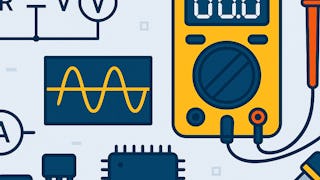 Status: NewNewB
Status: NewNewBBirla Institute of Technology & Science, Pilani
Skills you'll gain: Electronic Systems, Semiconductors, Basic Electrical Systems, Electrical Engineering, Electronics, Electronic Components, Electronics Engineering, Power Electronics, Electrical Systems, Engineering Analysis, Network Analysis, Engineering Calculations, Control Systems, Applied Mathematics
3.8·Rating, 3.8 out of 5 stars6 reviewsBeginner · Course · 1 - 3 Months
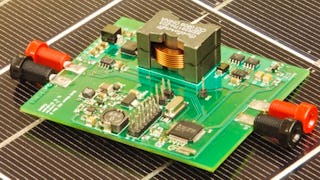 Status: Free TrialFree TrialU
Status: Free TrialFree TrialUUniversity of Colorado Boulder
Skills you'll gain: Power Electronics, Electronic Systems, Electrical Engineering, USB, Electrical Systems, Electronics, Electric Power Systems, Simulation and Simulation Software, Simulations
4.7·Rating, 4.7 out of 5 stars3.5K reviewsIntermediate · Course · 1 - 4 Weeks
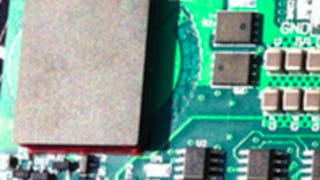 Status: Free TrialFree TrialU
Status: Free TrialFree TrialUUniversity of Colorado Boulder
Skills you'll gain: Power Electronics, Control Systems, USB, Electronic Systems, Simulations, Engineering Documentation, Semiconductors, Electrical Engineering, Engineering Design Process, Electrical Systems, Electronic Components, Electrical Power, Hardware Design, Electronics, Technical Communication, Electronics Engineering, electromagnetics, Electric Power Systems, Simulation and Simulation Software, Design Specifications
Build toward a degree
4.7·Rating, 4.7 out of 5 stars4.3K reviewsIntermediate · Specialization · 3 - 6 Months
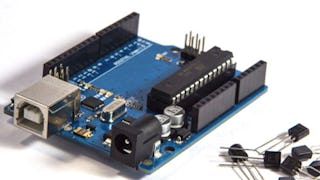 Status: Free TrialFree TrialU
Status: Free TrialFree TrialUUniversity of California, Irvine
Skills you'll gain: Internet Of Things, Basic Electrical Systems, Automation Engineering, Electronics, Electronic Components, Embedded Systems, Control Systems, Electronic Hardware, Wireless Networks, Electrical and Computer Engineering, Hardware Design, Peripheral Devices, Human Machine Interfaces, Electrical Wiring, Computer Systems, Programming Principles, Systems Engineering, Computer Programming, Remote Access Systems, Interactive Learning
4.7·Rating, 4.7 out of 5 stars4K reviewsMixed · Course · 1 - 4 Weeks
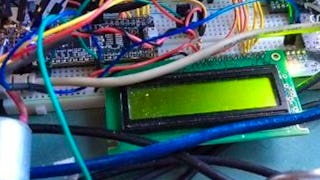 Status: Free TrialFree TrialU
Status: Free TrialFree TrialUUniversity of Colorado Boulder
Skills you'll gain: Control Systems, Machine Controls, Engineering, Scientific, and Technical Instruments, Process Control, Embedded Systems, Embedded Software, Real Time Data, Laboratory Experience, Electronic Systems, Electronics, Power Electronics, Electronic Hardware, Manufacturing Processes, Three-Phase, Automation Engineering, Electrical Equipment, Thermal Management, Hardware Design, Electrical Engineering, Electronics Engineering
Build toward a degree
4.6·Rating, 4.6 out of 5 stars2.9K reviewsIntermediate · Specialization · 3 - 6 Months
What brings you to Coursera today?
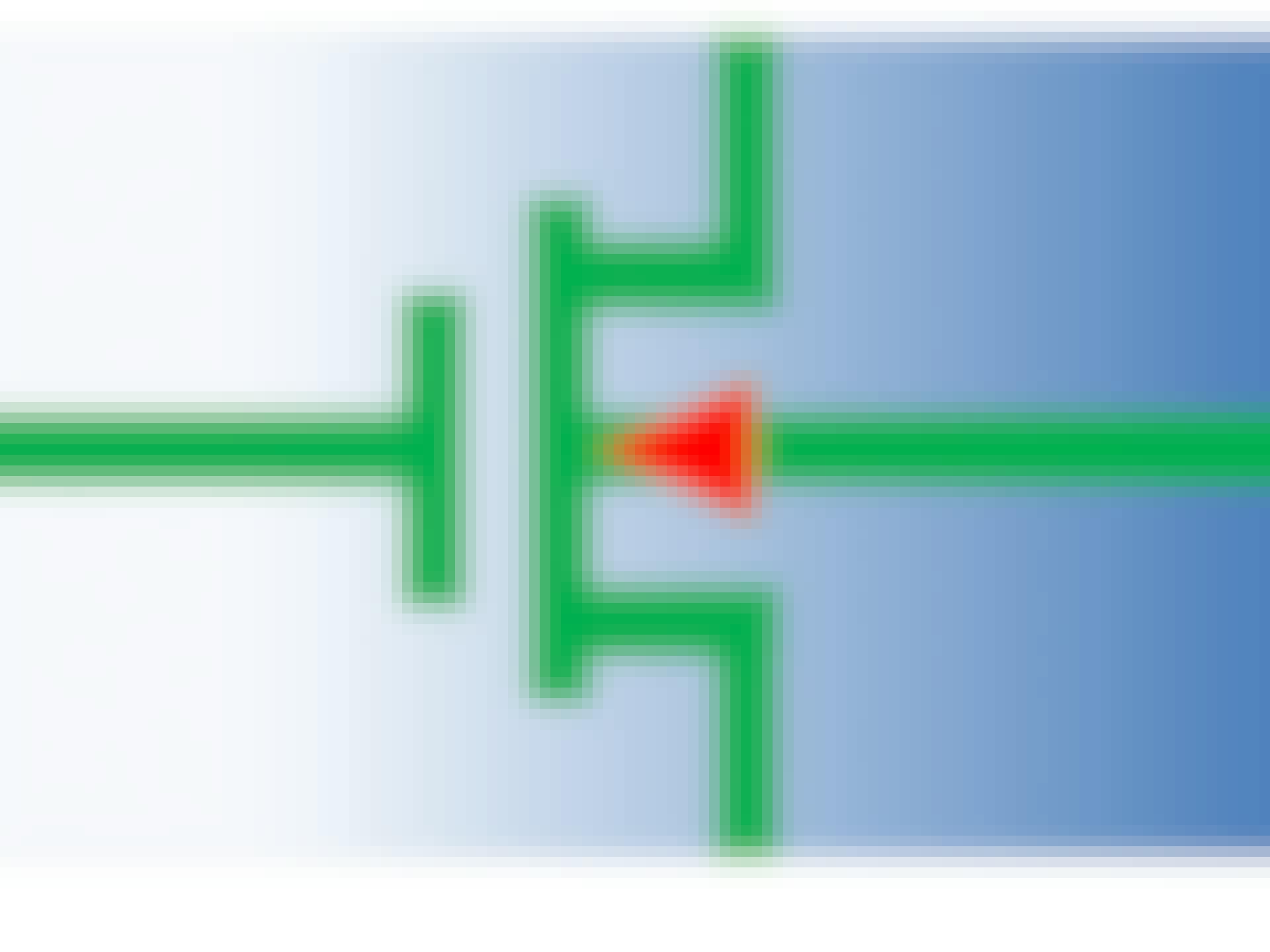 Status: FreeFreeC
Status: FreeFreeCColumbia University
Skills you'll gain: Semiconductors, Electronics, Electronics Engineering, Electronic Components, Simulation and Simulation Software, Electrical Engineering, Simulations, Mathematical Modeling, Model Evaluation, Differential Equations, Calculus
4.6·Rating, 4.6 out of 5 stars150 reviewsMixed · Course · 1 - 3 Months
 Status: PreviewPreviewU
Status: PreviewPreviewUUniversitat Autònoma de Barcelona
Skills you'll gain: Computer Architecture, Systems Design, Technical Design, Application Specific Integrated Circuits, Digital Design, Hardware Architecture, Computer Hardware, Verification And Validation
4.3·Rating, 4.3 out of 5 stars858 reviewsIntermediate · Course · 1 - 3 Months
 Status: PreviewPreviewG
Status: PreviewPreviewGGeorgia Institute of Technology
Skills you'll gain: Basic Electrical Systems, Electronic Components, Electrical Systems, Electronic Systems, Electrical Engineering, Engineering Analysis, Electronics, Engineering Calculations, Physics, Schematic Diagrams
4.5·Rating, 4.5 out of 5 stars1.5K reviewsMixed · Course · 1 - 3 Months
 Status: Free TrialFree TrialU
Status: Free TrialFree TrialUUniversity of Colorado Boulder
Skills you'll gain: Power Electronics, Electronic Systems, Control Systems, Electrical Engineering, electromagnetics, Electronics Engineering, Electric Power Systems, Electronics, Model Based Systems Engineering, Engineering Analysis, Simulations, Simulation and Simulation Software, Mathematical Modeling, Electrical Systems, Computer-Aided Design, Matlab, Technical Design, Systems Design, Verification And Validation, Systems Analysis
Build toward a degree
4.7·Rating, 4.7 out of 5 stars160 reviewsIntermediate · Specialization · 3 - 6 Months
 Status: NewNewStatus: PreviewPreview
Status: NewNewStatus: PreviewPreviewSkills you'll gain: USB, Electronic Hardware, Hardware Design, Electronics, Electrical Systems, Electronics Engineering, Electrical Power, Power Electronics, Electronic Components, Routing Protocols, Computer-Aided Design, Schematic Diagrams, Design, Design Specifications, Design Strategies, Verification And Validation, Data Import/Export
Intermediate · Course · 1 - 4 Weeks
 Status: Free TrialFree Trial
Status: Free TrialFree TrialSkills you'll gain: Embedded Software, C (Programming Language), Embedded Systems, Debugging, Peripheral Devices, Integrated Development Environments, Computer Programming Tools, Development Environment, System Programming, Electronics, Software Development Tools, Hardware Architecture, Data Structures, Electronic Hardware, Microarchitecture, Programming Principles, Performance Tuning, Computer Architecture, Control Systems, Computer Programming
4.5·Rating, 4.5 out of 5 stars268 reviewsIntermediate · Specialization · 3 - 6 Months
What brings you to Coursera today?
In summary, here are 10 of our most popular electronics courses
- Introduction to Electronics: Georgia Institute of Technology
- Basic Electronics: Birla Institute of Technology & Science, Pilani
- Introduction to Power Electronics: University of Colorado Boulder
- Power Electronics: University of Colorado Boulder
- Interfacing with the Arduino: University of California, Irvine
- Embedding Sensors and Motors: University of Colorado Boulder
- MOS Transistors: Columbia University
- Digital Systems: From Logic Gates to Processors: Universitat Autònoma de Barcelona
- Linear Circuits 1: DC Analysis: Georgia Institute of Technology
- Modeling and Control of Power Electronics: University of Colorado Boulder
Frequently Asked Questions about Electronics
Electronics is a branch of science and engineering that deals with the study and application of electrical devices and systems. It plays a crucial role in modern technology, powering everything from smartphones to medical devices. Understanding electronics is important because it enables individuals to innovate, troubleshoot, and improve various technologies that impact daily life and industries.
A career in electronics can lead to various job opportunities, including electronics technician, electrical engineer, circuit designer, and systems analyst. These roles are essential in sectors such as telecommunications, automotive, healthcare, and consumer electronics, where professionals design, test, and maintain electronic systems and devices.
To succeed in electronics, you need a solid foundation in mathematics and physics, along with skills in circuit design, troubleshooting, and programming. Familiarity with tools like oscilloscopes and multimeters, as well as knowledge of microcontrollers and embedded systems, can also be beneficial. These skills will empower you to work effectively in various electronics-related roles.
Some of the best online courses for learning electronics include Introduction to Electronics and Power Electronics Specialization. These courses cover fundamental concepts and practical applications, making them suitable for beginners and those looking to enhance their skills.
Yes. You can start learning electronics on Coursera for free in two ways:
- Preview the first module of many electronics courses at no cost. This includes video lessons, readings, graded assignments, and Coursera Coach (where available).
- Start a 7-day free trial for Specializations or Coursera Plus. This gives you full access to all course content across eligible programs within the timeframe of your trial.
If you want to keep learning, earn a certificate in electronics, or unlock full course access after the preview or trial, you can upgrade or apply for financial aid.
To learn electronics, start by exploring foundational courses that cover basic concepts and principles. Engage in hands-on projects to apply what you learn, and consider joining online forums or study groups to connect with others. Consistent practice and seeking feedback will help reinforce your understanding and skills.
Typical topics covered in electronics courses include circuit analysis, semiconductor devices, digital electronics, and signal processing. Advanced courses may also explore power electronics, embedded systems, and the latest technologies in the field, providing a comprehensive understanding of both theoretical and practical aspects.
For training and upskilling employees in electronics, courses like Modeling and Control of Power Electronics Specialization and Introduction to Power Electronics are highly recommended. These programs focus on practical skills and industry-relevant knowledge, making them ideal for workforce development.










